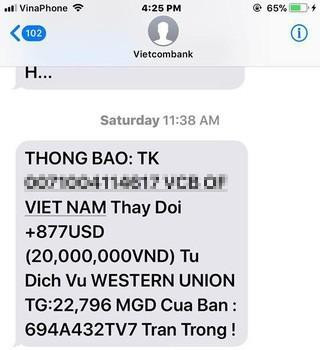Can criminals even fake bank messages?
Not only can card criminals pretend to be depositors to trick account owners into providing their login names and passwords for online banking, they can also send messages via the bank's phone number.
After providing his name and account number, Mr. D.T. received a text message from Vietcombank informing him that his account had received 877 USD, converted at the exchange rate of 22,796 VND/USD, so the amount Mr. D.T. received was 20 million VND.
Because the money was not found in the account, when the criminal impersonating Western Union sent an email asking him to click on a link to confirm, Mr. D.T. followed the link. He was asked to provide his name and password.
Because he believed that the money transfer message was sent from the bank, Mr. D.T. lost his vigilance and provided information to the criminals. The criminals then continued to trick him into providing the OTP code to take a total of more than 59.2 million VND from Mr. D.T.'s account.
 |
| Message Mr. D.T received |
After stealing the money, the criminals attacked and took over Mr. D.T's Facebook and Gmail accounts within a day and deleted all traces of emails and chats.
After two complaints, on November 7, Vietcombank Ho Chi Minh City worked with Mr. D.T. At the meeting, Mr. D.T. presented the text messages and the Vietcombank representative admitted that the text message notifying that his account had received 877 USD was sent from Vietcombank's number.
However, according to a representative of Vietcombank Ho Chi Minh City, this message was not sent by the Bank because it was different from normal messages.
The two most obvious points are that the bank never calls customers "you" but "dear customer" in text messages and the bank never rounds up numbers when converting exchange rates.
For example, if 877 USD is converted at the exchange rate of 22,795 VND/USD, it will be 19,991,215 VND. Meanwhile, the amount reported in the message is 20 million VND, which means it has been rounded.
"So it is possible that criminals have become more sophisticated and can somehow send fake messages from the bank's switchboard number," said a representative of Vietcombank Ho Chi Minh City.
This representative also said that the case has been transferred to the Hanoi Headquarters so that the Headquarters can work with the network operator and at the same time transfer the case to the police for investigation and clarification.
Mr. N.D.T also asked the bank to clarify the message from the switchboard, why fake messages could be sent from the bank's switchboard. This is also to avoid risks for other customers in the future.
According to Tuoi Tre Newspaper
| RELATED NEWS |
|---|

